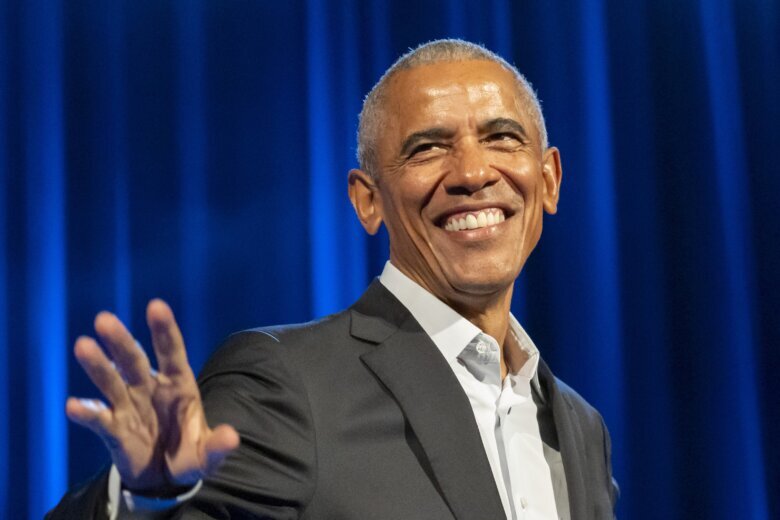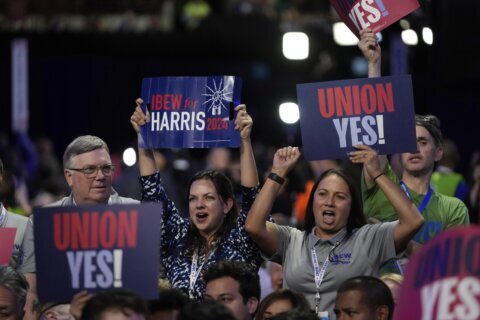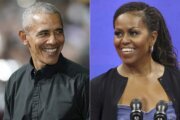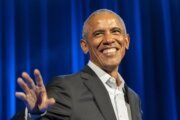Sign up for WTOP’s Election Desk weekly newsletter to stay up-to-date through Election Day 2024 with the latest developments in this historic presidential election cycle.
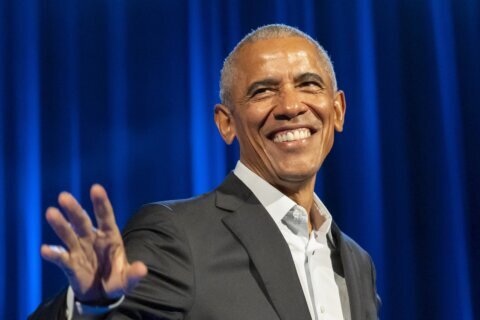
Barack Obama was days shy of his 43rd birthday and months from being elected to the U.S. Senate when he stepped onto a Boston stage at the 2004 Democratic National Convention.
A state lawmaker from Illinois, he had an unusual profile to be a headline speaker at a presidential convention. But the self-declared “skinny kid with a funny name” captivated Democrats that night, going beyond a requisite pitch for nominee John Kerry instead to introduce the nation to his “politics of hope” and vision of “one United States of America” not defined or defeated by its differences.
Kerry lost that November to Republican President George W. Bush. But Obama etched himself into the national consciousness, beginning a remarkable rise that put him in the Oval Office barely four years later. And now, eight years removed from the presidency, Obama returns Tuesday night to the Democratic convention as the elder statesman with a different task.
Speaking in his political hometown of Chicago, the nation’s first Black president will honor President Joe Biden’s legacy after his exit from the campaign while making the case for another historic figure, Vice President Kamala Harris. It’s poised to be a significant moment as she takes on former President Donald Trump in a matchup that features the same cultural and ideological fissures Obama warned against two decades ago.
“President Obama is still a north star in the party,” said Illinois Lt. Gov. Juliana Stratton, who credits the 44th president with helping her become her state’s first Black woman lieutenant governor.
Besides Harris herself on Thursday, Stratton said, no voice this week is more integral to stirring Democrats, reaching independents and cajoling moderate Republicans than the former president.
“He knows how to get across the finish line,” she said.
Former first lady Michelle Obama, who is popular enough in her own right that some Democrats floated her as an alternative to Biden, will be speaking Tuesday night as well.
Laying the groundwork
Barack Obama’s two decades in public life have been defined by seminal speeches. His body of work features a range of tone and purpose — an array of choices as he seeks to strike the right balance for Harris as she tries to become the first woman, second Black person and first person of South Asian descent to reach the presidency.
In 2004, Obama used his invitation from Kerry and then-Democratic Chairman Terry McAuliffe to mix lofty themes with storytelling, humor and his biography as the son of a Black man from Kenya and a white woman from Kansas.
“Let’s face it, my presence on this stage is pretty unlikely,” Obama told delegates and a national television audience.
McAuliffe, however, remembered Obama as an obvious rising star. “I’d known him … done events for him” as he ran for U.S. Senate, McAuliffe said in an interview. Still, no one could have foreseen Obama’s performance and the reaction — because he’d never been on such a stage.
“It was an electrifying moment,” McAuliffe recalled. “It obviously laid the groundwork for him to be successful, the nominee and candidate in 2008.”
In 16 minutes — shorter than a typical nomination acceptance, inaugural address or State of the Union — Obama told his origin story, framed the 2004 election and talked up Kerry and his running mate, John Edwards. Obama was short on policy, but his sweeping indictment of divisive politics struck a chord.
“There is not a liberal America and a conservative America; there is the United States of America. There is not a Black America and a White America and Latino America and Asian America; there’s the United States of America,” he said in perhaps the most well-remembered passage. “Do we participate in a politics of cynicism or do we participate in a politics of hope?”
Two-and-a-half-years later, Obama reprised that theme when he launched his presidential campaign before thousands of supporters gathered outside the Illinois capital of Springfield. His campaign motto: Hope and Change.
Pennsylvania Lt. Gov. Austin Davis, the first Black person to occupy his office in the commonwealth, recalled watching that winter scene as a high school student. “That was the moment that clicked with me,” Davis said and, later on, “helped me to believe that I could achieve these things that I’ve achieved.”
A different tone
If idealistic, even nebulous themes brought Obama to the White House door, it was bare-knuckled politics and ice-water realism that got him through it.
In March 2008, then-candidate Obama was being pilloried for his friendship with his Black pastor, the Rev. Jeremiah Wright, who had a record of critiquing the nation’s history of white supremacy. At issue, in part, was a video clip of Wright declaring “God, Damn America” from the pulpit of Obama’s home church.
This time, soaring rhetoric wouldn’t do. Obama hand wrote a nearly 38-minute address explaining his relationship with Wright, with the context of U.S. history and race relations in the early 21st century.
“I can no more disown him than I can disown the Black community,” Obama said, while rejecting Wright’s “view that sees white racism as endemic and that elevates what is wrong with America above all that we know is right with America.”
The speech, titled “A More Perfect Union,” was rife with nuance — a risk in presidential politics. But it worked.
Obama’s convention address that August certainly featured his characteristic promises of hope and change. The venue and crowd — 84,000 people in the Denver Broncos’ football stadium — affirmed his celebrity status. Another takeaway, though, was Obama’s blitz on Republican nominee John McCain. Having spent weeks resisting calls from Democrats to go after the Vietnam war hero, Obama hammered the Arizona senator as a rubber-stamp for the outgoing Bush administration, out-of-step with most Americans and weak on the world stage.
“You know, John McCain likes to say that he’ll follow (9/11 mastermind Osama) bin Laden to the gates of Hell, but he won’t even follow him to the cave where he lives,” Obama said at one point.
It would preview Obama’s most unsparing speech, his 2020 appearance at Democrats’ virtual convention. Speaking on behalf of Biden, his onetime vice president, Obama framed Trump as fundamentally unfit for office. It was the most scathing indictment of a sitting president by one of his predecessors in modern U.S. history.
“This administration has shown it will tear our democracy down if that’s what it takes to win,” Obama said, almost five months before Trump’s supporters attacked the U.S. Capitol in an effort to prevent Biden’s certification as the 2020 election winner.
Weight of history
McAuliffe said Obama’s role Tuesday, in part, is to reinforce the message of multiple presidents: Biden spoke Monday and President Bill Clinton speaks Wednesday.
“They’re going to talk about what happens when you get a Democratic president,” McAuliffe said, especially on the economy. It’s Obama’s turn, McAuliffe said, to join Clinton as “explainer in chief” — a nod to Clinton’s 2012 convention speech when Obama was seeking reelection. The idea, McAuliffe said, is to set up Harris as the natural Democratic successor.
For her part, Stratton said she expects to see the man she has seen connect with voters individually and en masse. A volunteer on Obama’s 2012 reelection campaign, she remembers the then-president visiting his campaign’s Hyde Park office in Chicago on Election Day.
“He was funny and down to earth” as he shook hands with volunteers and then began calling voters himself, she recalled.
Four years earlier, Stratton and her four daughters were among the throngs in Chicago’s Grant Park for Obama’s first presidential victory speech. “Strangers were hugging and crying,” she said. “We saw this Black family come out, knowing they were headed to the White House. It was a remarkable moment.”
On Tuesday, she said, there is space for Obama to bring heat on Trump, talk directly to American voters and honor the magnitude of Harris’ moment.
“He was a historic candidate and president. He knows what this is like,” Stratton said. “There will be this sweet moment of the first Black president passing the baton.”
Copyright © 2024 The Associated Press. All rights reserved. This material may not be published, broadcast, written or redistributed.

